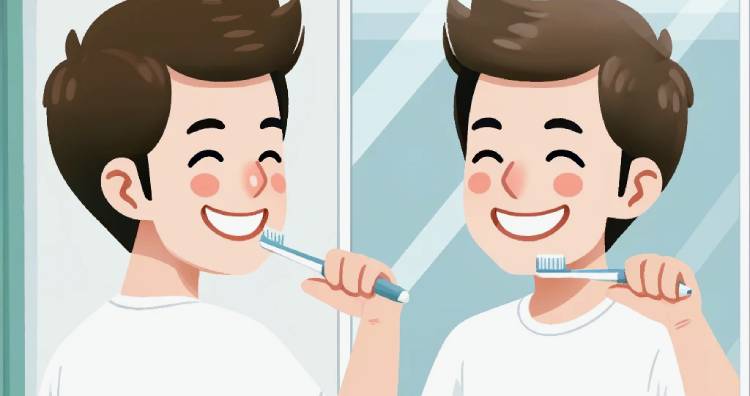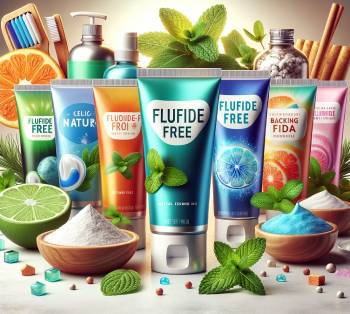Fluoride, a common ingredient, is touted for preventing tooth decay, but it’s not without controversy. Some experts argue it might do more harm than good, linking it to dental and skeletal fluorosis, potential neurotoxicity, and thyroid issues.
Plus, there’s an environmental impact to consider. This article will delve into why avoiding fluoride in toothpaste could be a smart move for your health and the planet.
By the end, you’ll know why switching to a fluoride-free option could be the best choice for you and your family.
The Fluoride Debate: What’s the Big Deal?

Let’s kick things off by understanding what fluoride is and why it’s such a hot topic. Fluoride is a mineral that’s found in various amounts in water, soil, and foods. It’s been added to toothpaste and water supplies for decades because it’s believed to help prevent tooth decay.
Sounds great, right?
But here’s the catch: not everyone agrees that fluoride is as beneficial as we’ve been led to believe. In fact, some experts argue that it could do more harm than good.
Health Concerns Linked To Fluoride
- Dental Fluorosis: When More Isn’t Better
One of the most well-known issues with fluoride is dental fluorosis. This condition occurs when you’re exposed to too much fluoride during the early years of life. It can cause discoloration and damage to the enamel of your teeth.
If you’ve noticed white streaks or brown stains on your teeth, fluoride could be the culprit. And let’s be honest, nobody wants stained teeth!
- Skeletal Fluorosis: A Hidden Danger
It doesn’t stop at your teeth. High levels of fluoride can also affect your bones. Skeletal fluorosis is a condition where fluoride accumulates in your bones, making them brittle and more prone to fractures.
This is a serious health issue, and it can be painful and debilitating. While it’s more common in areas with high natural fluoride levels in water, it’s a risk worth considering.
- Potential Neurotoxicity: Your Brain on Fluoride
Now, let’s talk about something even more alarming: the potential effects of fluoride on your brain. Some studies suggest that excessive fluoride exposure could be linked to lower IQ levels in children.
Yikes!
While the research is ongoing, it’s enough to make any parent think twice about the fluoride in their kids’ toothpaste.
- Thyroid Function: An Unexpected Side Effect
Did you know that fluoride can affect your thyroid gland?
Your thyroid regulates your metabolism and plays a crucial role in your overall health. Excessive fluoride intake can disrupt the normal function of the thyroid, leading to conditions like hypothyroidism.
Symptoms can include fatigue, weight gain, and depression. If you’ve been struggling with these issues, fluoride could be a hidden factor.
- Environmental Impact: Fluoride and the Planet
It’s not just about personal health; fluoride can also have a negative impact on the environment. When fluoride gets into the water supply, it can harm aquatic life and disrupt ecosystems.
By choosing fluoride-free toothpaste, you’re not only protecting your health but also doing a small part to help the planet.
Fluoride-Free Toothpaste: A Safer Choice
- Natural Alternatives
So, what’s the alternative?
Fortunately, there are plenty of fluoride-free toothpaste options out there that use natural ingredients to keep your teeth clean and healthy.
Ingredients like baking soda, coconut oil, and essential oils can effectively clean your teeth and fight bacteria without the risks associated with fluoride.
- Benefits of Going Fluoride-Free
Switching to a fluoride-free toothpaste can have several benefits. For one, you’ll avoid the potential health risks we’ve discussed.
Plus, many fluoride-free toothpastes are made with natural, non-toxic ingredients, which means fewer chemicals in your body. And let’s not forget the peace of mind that comes with knowing you’re making a safer choice for your family.
Making The Switch: What To Look For
If you’re ready to make the switch, here are a few tips on what to look for in a fluoride-free toothpaste:

- Natural Ingredients: Look for toothpastes that use natural ingredients like baking soda, xylitol, and essential oils. These can effectively clean your teeth without the need for fluoride.
- No Harmful Chemicals: Avoid toothpastes with harmful chemicals like triclosan, sodium lauryl sulfate (SLS), and artificial sweeteners. These ingredients can cause irritation and other health issues.
- ADA Approval: While fluoride-free toothpastes may not have the American Dental Association (ADA) seal, some brands still meet rigorous standards for safety and effectiveness. Do your research and choose a reputable brand.
Personal Experiences: Real Stories from Fluoride-Free Users
You might be wondering, “What do other people think about fluoride-free toothpaste?” Well, many people who have made the switch report positive changes.
Some notice an improvement in their overall oral health, while others appreciate the peace of mind that comes with using a product free of potentially harmful ingredients.
Hearing real stories from others can be reassuring and motivating as you consider making this change yourself.
FAQs About Fluoride-Free Toothpaste
Absolutely! Fluoride-free toothpastes can be just as effective as their fluoride-containing counterparts. The key is to maintain good oral hygiene habits, like brushing twice a day, flossing, and visiting your dentist regularly.
Many dentists are open to the idea of fluoride-free toothpaste, especially if you’re committed to maintaining good oral hygiene. It’s important to have an open conversation with your dentist about your concerns and preferences. They can offer guidance and recommend fluoride-free products that suit your needs.
Yes, children can use fluoride-free toothpaste, and it can actually be a safer option. Since kids are more likely to swallow toothpaste, avoiding fluoride can prevent the risk of dental fluorosis and other health issues. Just be sure to choose a toothpaste specifically formulated for children.
Wrapping Up
So, why should you avoid fluoride in toothpaste?
We’ve covered a lot of ground today, from the potential health risks like dental and skeletal fluorosis to concerns about neurotoxicity and thyroid function. We’ve also explored the environmental impact and highlighted the benefits of switching to a fluoride-free toothpaste.
By making this change, you’re taking a proactive step toward better health for you and your family.
Choosing a fluoride-free toothpaste might seem like a small decision, but it can have a big impact on your overall well-being. It’s all about making informed choices that align with your health goals and values. So next time you’re in the toothpaste aisle, remember what you’ve learned here.
Trust yourself to make the best decision for your health. After all, you deserve to feel confident and healthy every day.
